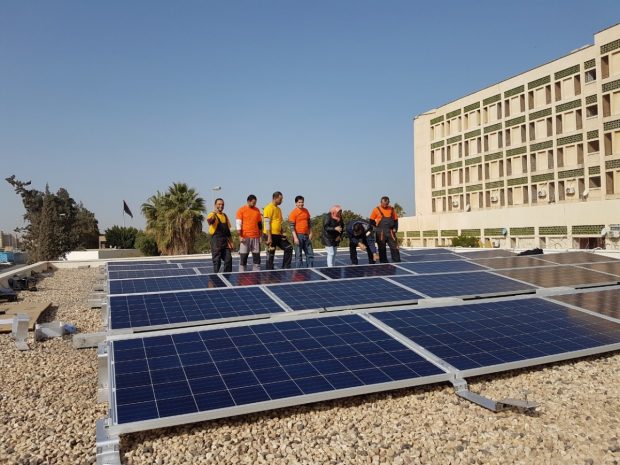UNDP: Basic services are essential to stabilising Libya

The call was grim and urgent. Worsening power cuts had knocked out electricity at a hospital in southern Libya, leaving kidney patients without the dialysis that was keeping them alive. After losing two patients, hospital staff phoned UNDP in despair. The answer was convincing: solar panels – a stable, clean and reliable energy supply.
Kidney disease is common in the Arab region, and power cuts have worsened steadily in Libya over the last six years. This was a disaster waiting to happen. UNDP was able to help, supporting the authorities to improve access to basic services through ensuring constant and cost-effective access to electricity, while also mitigating the impact of climate change and advancing multiple Sustainable Development Goals, in a country with plenty of sun.
Since a popular uprising in 2011—and a general election that erupted into conflict in 2014—Libya has grown increasingly fragmented. The country now has several political forces, each backed by different militias and tribes.
Delivery of basic services such as power and water, health and sanitation, has in many instances failed. In 2016, some power cuts lasted as long as 48 hours.
Insecurity, violence, a sharp drop in per capita earnings, and a major cash shortage in the banking system worsened an already chaotic situation. Some 17.5 percent of Libyan hospitals are closed, while the rest function at a fraction of their former capacity. Nearly 560 schools have been damaged or closed, while 400,000 people are food insecure. UN agencies estimate 1.3 million people are in need of urgent humanitarian assistance.
Stabilizing this situation and maintaining public confidence in an evolving peace process, in this case, means supporting the Government of National Accord and municipalities to deliver the basic services Libyans need and expect. Stabilizing Libya means first and foremost access to health, education, water and electricity.
Launched in April 2016, our Stabilization Facility for Libya aims to fill key gaps between humanitarian relief and sustainable, democratic development—providing supplies such as ambulances, garbage trucks, fire engines, solar panels, generators and computers for schools and government offices.
Energy is vital to the health sector, to keep operating theatres well lit, vaccines refrigerated, and dialysis machines working.
Making use of Libya’s ample sunshine, we have now installed solar panels in a total of nine hospitals in the east, west and south of the country. UNDP is also supporting the installation of solar PV systems for five additional hospitals, as well as innovative solar street lights for airport road lighting in Benghazi. We are also helping the government repair damaged infrastructure and deliver education, water and sanitation, benefiting more than 1.5 million people.
Providing such basic, vital services is key to meeting Libyans’ expectations. The UNDP-managed Stabilization Facility for Libya is allowing people to look ahead to lives of greater security, dignity and opportunity.
The Benghazi Kidney Center, which had been closed for two years, was also rehabilitated and reopened under the project. Some 2,500 patients require kidney treatment in Benghazi alone. As one patient said: “This showed us that work is happening after the war. It gives us hope for the future.”
How to submit an Op-Ed: Libyan Express accepts opinion articles on a wide range of topics. Submissions may be sent to oped@libyanexpress.com. Please include ‘Op-Ed’ in the subject line.
- Analysis: Trump’s presidential campaign and its implications - November 17, 2024
- Tunisian FM: Diplomatic presence ‘falls short of needs - November 17, 2024
- Lebanese Speaker: Ceasefire with Israel ‘more likely than not’ - November 17, 2024


